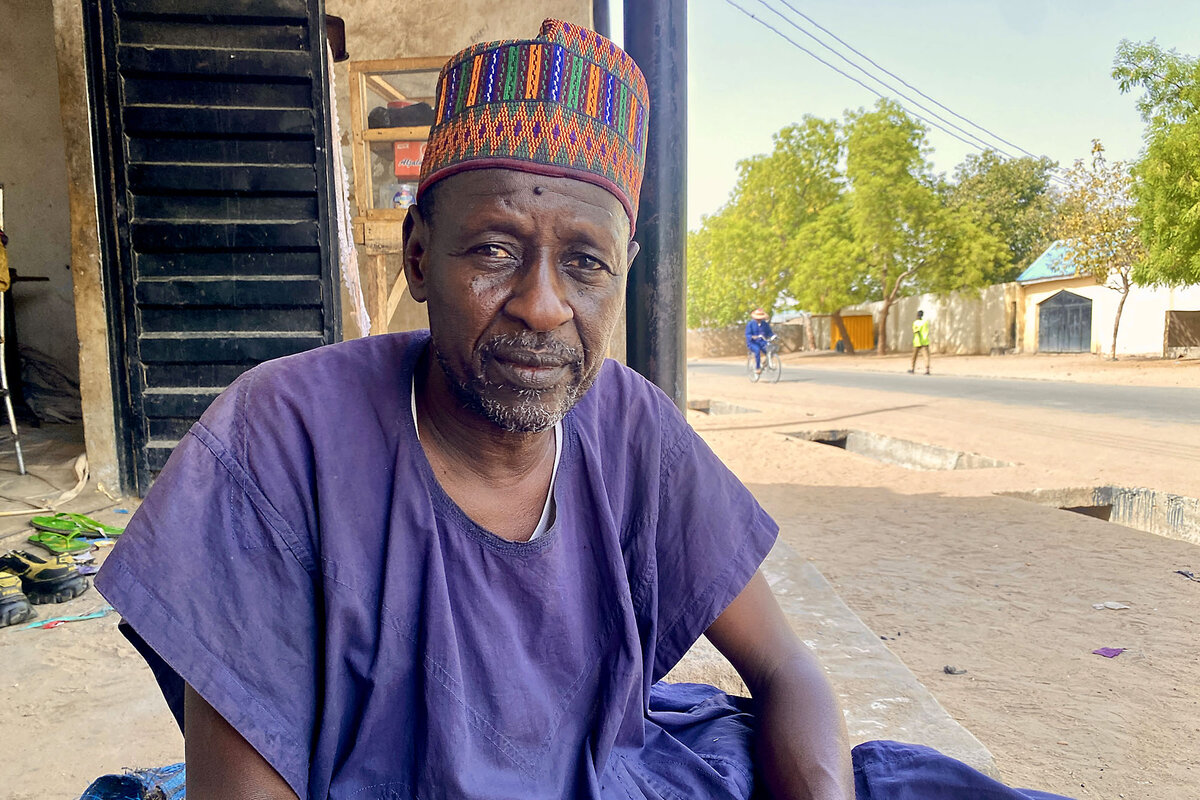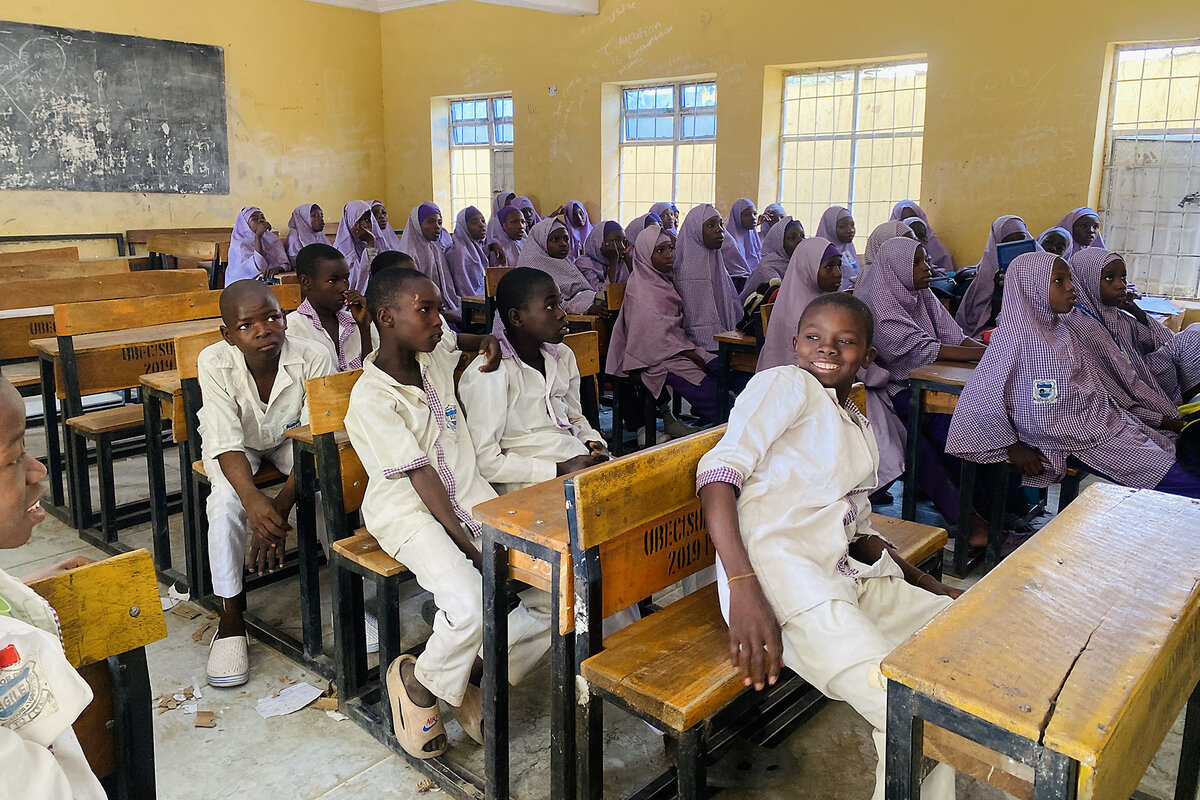Boko Haram made them child soldiers. Will their communities take them back?
Loading...
| Maiduguri, Nigeria
For nearly as long as the Nigerian government has been fighting Boko Haram’s insurgency, which began in the northern part of the country in 2009, it has been urging the group’s fighters to lay down their arms.
But only in the last three years, as Boko Haram has splintered and lost ground, have its members begun to take up this amnesty offer en masse. Today, some 160,000 former fighters and their families have been “reintegrated” into Nigerian society, according to estimates by the United Nations Office on Drugs and Crime.
Why We Wrote This
A story focused onAccepting Boko Haram’s child soldiers back into Nigerian society has been controversial. But advocates say this radical act of compassion is the only way their society can heal.
The experiences of former child soldiers, however, point to how complex those efforts can be. Shunned by their communities, many have struggled to find a place for themselves outside Boko Haram’s orbit.
“How could we live alongside those responsible for such pain?” asks Bulami Goni, whose father was killed by Boko Haram.
But advocates for the former child soldiers say it isn’t impossible.
“Kindness always pays,” says Bulama Maina Audu, who works with a group helping these young men return home.
Abba Gana was only 10 years old when Boko Haram insurgents attacked his village in northern Nigeria in 2014. Along with the other boys his age, he was kidnapped and forced to herd the militants’ livestock.
By the time he was 15, Mr. Gana had joined the ranks of the group’s fighters, carrying out raids like the one on his own village.
“Growing up with them, I thought I was fighting for a greater cause,” he says of his time with the group, whose goal is to create a fundamentalist Islamic state. Gradually though, the life of fighting and hiding began to wear him down.
Why We Wrote This
A story focused onAccepting Boko Haram’s child soldiers back into Nigerian society has been controversial. But advocates say this radical act of compassion is the only way their society can heal.
Then one day in 2022, he heard a government radio program urging Boko Haram members to surrender. “They said ... that we are welcome back [to our communities] if we repent,” he recalls.
For the first time, Mr. Gana says, he allowed himself to imagine that he might be able to go home.
For nearly as long as the Nigerian government has been fighting Boko Haram’s insurgency, which began in 2009, it has been urging the group’s fighters to lay down their arms.
But only in the last three years, as Boko Haram has splintered and lost ground, have its members begun to take up this amnesty offer en masse. Today, some 160,000 former fighters and their families have been “reintegrated” into Nigerian society, according to estimates by the United Nations Office on Drugs and Crime (UNODC).
The experiences of former child soldiers like Mr. Gana, however, point to how complex those efforts can be. Shunned by their communities, many have struggled to find a place for themselves outside Boko Haram’s orbit. But their supporters say it isn’t impossible.
“Kindness always pays,” says Bulama Maina Audu, whose nephew was abducted by Boko Haram in 2014, and who now works with a group helping former child soldiers return home.
The transition
In 2013, then-President Goodluck Jonathan announced that Nigeria’s government was offering amnesty to Boko Haram militants willing to leave the group. But it wasn’t until one of Boko Haram’s leaders, Abubakar Shekau, died in 2021, that a large number of fighters began to take up the offer.
Their departure weakened Boko Haram, but it also presented new challenges.
“It has been a struggle to even consider living alongside those responsible for my family’s suffering,” says Lawan Kyari, who lost both his parents and an uncle in attacks by Boko Haram and spent years displaced from his home.
“How could we live alongside those responsible for such pain?” agrees Bulami Goni, whose father was killed by Boko Haram, leaving him responsible for an extended family of 20 people.
For Modu Kura, who was 10 when he was abducted by the insurgents in 2013, the hostility he encountered when he left Boko Haram nearly sent him back to the group.
“Someone once said to me, ‘If you kill a scorpion, the scorplings will come for you, [so] you have to finish them all,’” Mr. Kura says. To his community, he was the baby scorpion that had to be destroyed.
Kindness pays off
Those working with Boko Haram’s former child fighters, however, see learning to live side by side as the only way their society can heal.
“The fears and concerns of the communities they are returning to are completely legitimate, but they can only be addressed through dialogue,” says Oliver Stolpe, UNODC country representative for Nigeria.
To that end, in 2021, UNODC started a program in Nigeria called Strive Juvenile, which helps children abducted by Boko Haram find their way back into society. To date, the organization – which is now run by the Nigerian government – has helped more than 2,500 children leave the militant group.
Former child soldiers must be accepted “without stigmatizing or insulting them,” says Hauwa Rawa Ngala, who once fled her home to escape Boko Haram’s reign of terror. She now works with Strive Juvenile helping the group’s former members return home.
Muhammed Ibrahim, a community leader and member of Strive Juvenile, recalls how Mr. Gana behaved when he first left Boko Haram in 2022.
“His mind was still fixated on Boko Haram; he was secluded and would sometimes start screaming and threatening to carry out attacks,” Mr. Ibrahim recalls.
When the organization realized that Mr. Gana was severely traumatized, members made sure he was never alone, says Mr. Ibrahim, enrolling him in school during the day and in evening Quran classes. Eventually, he made friends and began to feel comfortable in his new life.
“All we want is a peaceful future where we can all live in harmony,” Ms. Ngala says.
This article was produced in collaboration with Egab.









